How to Take Care of a Yorkie
Yorkshire Terriers may be small, but their personalities are HUGE—and so are their care needs! Whether you’re a new Yorkie parent or a seasoned pro, our updated 2025 guide covers everything from cutting-edge health tips to the easiest grooming hacks. Let’s keep your pup happy, healthy, and totally spoiled (because let’s be honest—they already own your heart!).”
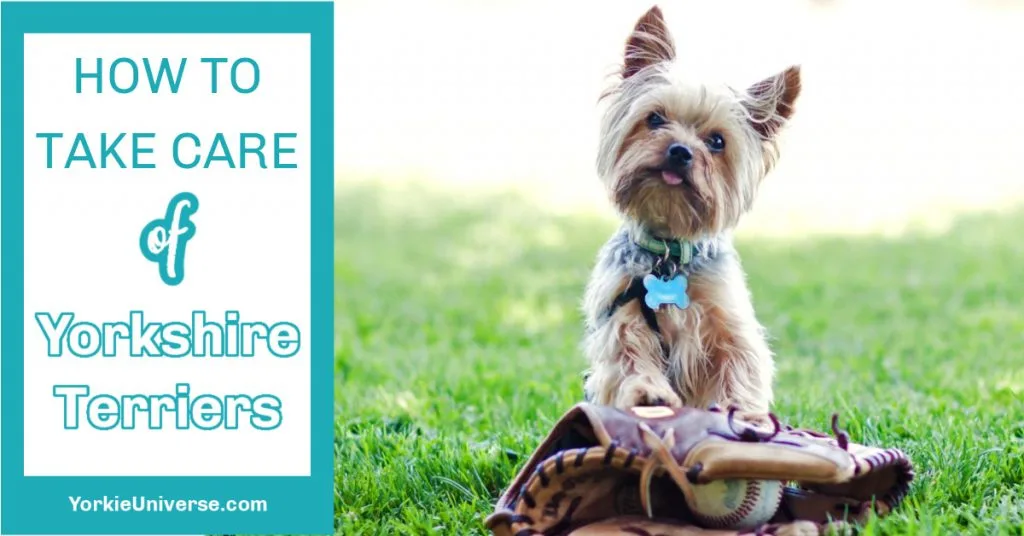
Diet and Nutrition: Feeding Your Tiny Royalty
Yorkies have tummies as delicate as their egos! Here’s the scoop on keeping them nourished:
- Kibble Choices: Look for small-bite formulas made for toy breeds (we love Royal Canin Yorkshire Terrier).
- Grain-Free? Recent studies link some grain-free diets to heart issues—grains are fine unless your vet says otherwise!
- Fresh Food Frenzy: Services like The Farmer’s Dog deliver perfectly portioned, human-grade meals (great for picky eaters).
- Treat Smarts: Yorkies gain weight fast! Stick to healthy snacks like blueberries or freeze-dried liver.
- Hydration Station: Try a pet water fountain—many Yorkies prefer running water (so fancy!).
- More about your Yorkie’s nutrition here.
Pro Tip: For puppies or very tiny adult Yorkies, split meals into 3-4 small portions to prevent hypoglycemia (common in tiny pups).
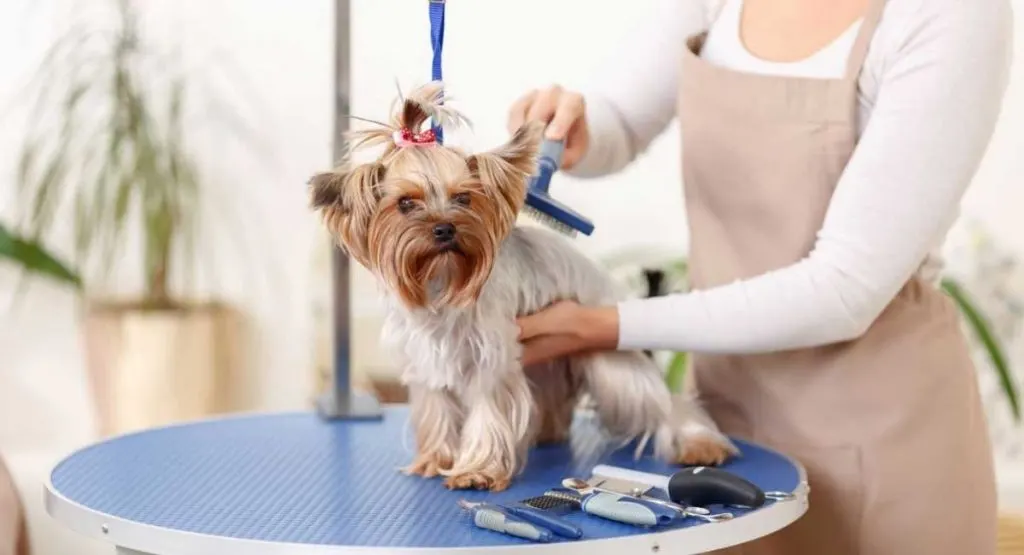
Grooming: Keeping That Silky Coat Gorgeous
That show-stopping Yorkie coat doesn’t maintain itself! Here’s the 2024 lowdown:
Puppy Cut vs. Long Coat:
Many owners now opt for having their groomer do a short “puppy cut” (less brushing, fewer mats). But if you’re committed to the long look:
- Daily brushing with a slicker brush + metal comb.
- Silk-lined hoodies prevent breakage and keep hair clean between baths.
- Bath Time: Every 2-4 weeks with a gentle shampoo (Earthbath Oatmeal is a fan favorite).
- Topknot Trick: Use non-rubber hair ties (ouch-free!) and spritz with detangling spray first.
Dental Health: Yorkies are prone to nasty tartar. Try:
- Toothbrushing (use poultry-flavored toothpaste!).
- Water additives like TropiClean for fresh breath.
Watch Out For: Tear stains! Wipe daily with a damp cloth and ask your vet about dietary causes.

Health Must-Knows
These little guys have some breed-specific quirks. You can read this for more in-depth info about health issues, but a few of them are:
Common Issues:
- Luxating patellas (wobbly knees)
- Dental disease (sooo common!)
- Tracheal collapse (always use a harness, NOT a collar)
Genetic Testing:
- Kits like Embark screen for 200+ health risks (worth it!).
Anxiety Aid:
Many Yorkies have “big feelings.” Try:
- Thundershirts during storms.
- Adaptil diffusers for separation stress.
Emergency Note: Xylitol also known as Birch Sugar (in sugar-free gum/candy and a few peanut butters) is DEADLY—keep it far away!
Exercise Needs: Big Energy in a Tiny Package
Don’t let their size fool you—Yorkies are lively little dynamos! They need exercise too. Here’s how to keep them happily active:
- Daily Walks: 20-30 minutes total (split into 2-3 short outings). Their tiny legs work harder than yours!
- Indoor Playtime: Perfect for bad weather days. Try:
- Fetch with mini plush toys
- Hide-and-seek (their noses love this!)
- Fetch with mini plush toys
- Mental Exercise: Puzzle toys (Outward Hound Hide-a-Squirrel is a hit) prevent boredom barking.
- Watch the Jumps: Yorkies love leaping off furniture—use pet stairs to protect their delicate joints.
Pro Tip: A tired Yorkie is a well-behaved Yorkie. If they’re chewing shoes or barking at shadows, they probably need more playtime!
Do Yorkies Need Toys? Absolutely!
Toys aren’t just fun—they’re essential for your Yorkie’s happiness and health:
Must-Have Toys:
- Chew Toys: For teething pups and dental health (try Benebone or Nylabone).
- Interactive Toys: Puzzle feeders (Kong Classic) keep their smart brains busy.
- Comfort Toys: A snuggle plushie helps with separation anxiety.
Safety First:
- Avoid toys with small parts they could swallow.
- Supervise rope toys—Yorkies love unraveling them (and eating the strings!).
Are Yorkies Good With Other Pets?
The short answer? It depends! Yorkies can be BFFs with other animals… if introduced properly:
- With Other Dogs: Usually fine with calm, gentle dogs. Supervise play with big pups—Yorkies don’t know they’re small!
- With Cats: Possible, but early socialization is key. Some Yorkies think they’re bigger than the cat!
- With Small Pets (birds, hamsters, etc.): Not recommended—their terrier instincts might kick in.
Make Friends Slowly:
- Start with scent swapping (let them sniff each other’s blankets).
- Use baby gates for face-to-face introductions.
- Reward calm behavior with treats!
Training Your Yorkie (Yes, It’s Possible!)
Don’t let their size fool you—Yorkies are whip-smart (and stubborn!).
Potty Training:
- Bell training: Hang a bell by the door—they’ll learn to ring it to go out!
- Artificial grass pads for apartment dwellers.
- We have an article with more info about potty training here.
Stop the Yapping:
- Teach “quiet” with high-value treats.
- Puzzle toys keep busy minds occupied.
- Leash Manners: A step-in harness (like Puppia) protects their delicate trachea.
Real Owner Tip: “I trained mine with a toothbrush—now he thinks it’s a treat!” – @YorkieMomma
Loving Your Yorkie to the Max
Safety Upgrades:
GPS collar (Fi Series) for escape artists.
Pet camera (Furbo) to check on them remotely.
Comfort Essentials:
Heated bed (they get chilly!).
Travel carrier with peek-a-boo windows.
Yorkie Parent Hacks: Genius Tips from Fellow Owners!
We asked Yorkie parents like you to share their *best-kept secrets*—here are the most clever, adorable, and downright genius tips we received:
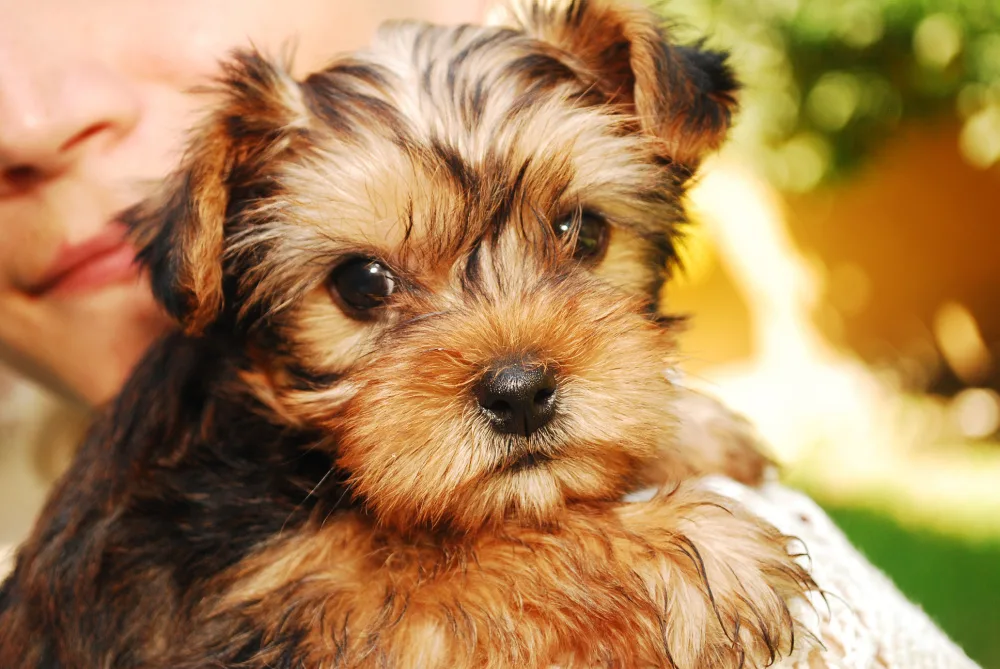
✨ Life-Changing Yorkie Hacks
1. The Sock Dryer™
“After baths, I put baby socks on my Yorkie’s paws—it stops her from slipping on tiles AND she looks hilarious waddling around.” – @TinyButMighty
2. Peanut Butter Toothbrush Trick
*”My Yorkie would never let me brush his teeth… until I smeared peanut butter (xylitol-free!) on the bathroom mirror. Now he licks it off while I brush!”* – @SirBarksALot
3. The “Decoy Keyboard”
“I keep an old keyboard next to my laptop—my Yorkie ‘helps’ me work by sitting on it instead of my real one!” – @HomeOfficePup
4. Freeze Their Kibble
“I stuff kibble into a Kong, add water, and freeze it. It keeps my Yorkie busy for HOURS and soothes his teething gums!” – @PuppyBrainFreeze
5. Hair Tie Savior
“Hair beads (the kind that are often used with dreadlocks) make great ties for a Yorkie’s topknot—they stay in place!” – @GlamPupMom
6. The Blanket Burrito
“My Yorkie refuses to sleep alone. Now I tuck her into a fleece blanket ‘burrito’ next to my pillow—zero whining!” – @SnugglePro
7. Stair Safety Net
*”I stretched a tension rod + mesh net across my staircase. No more heart attacks when my daredevil tries to leap down!” – @SafetyFirstYorkie
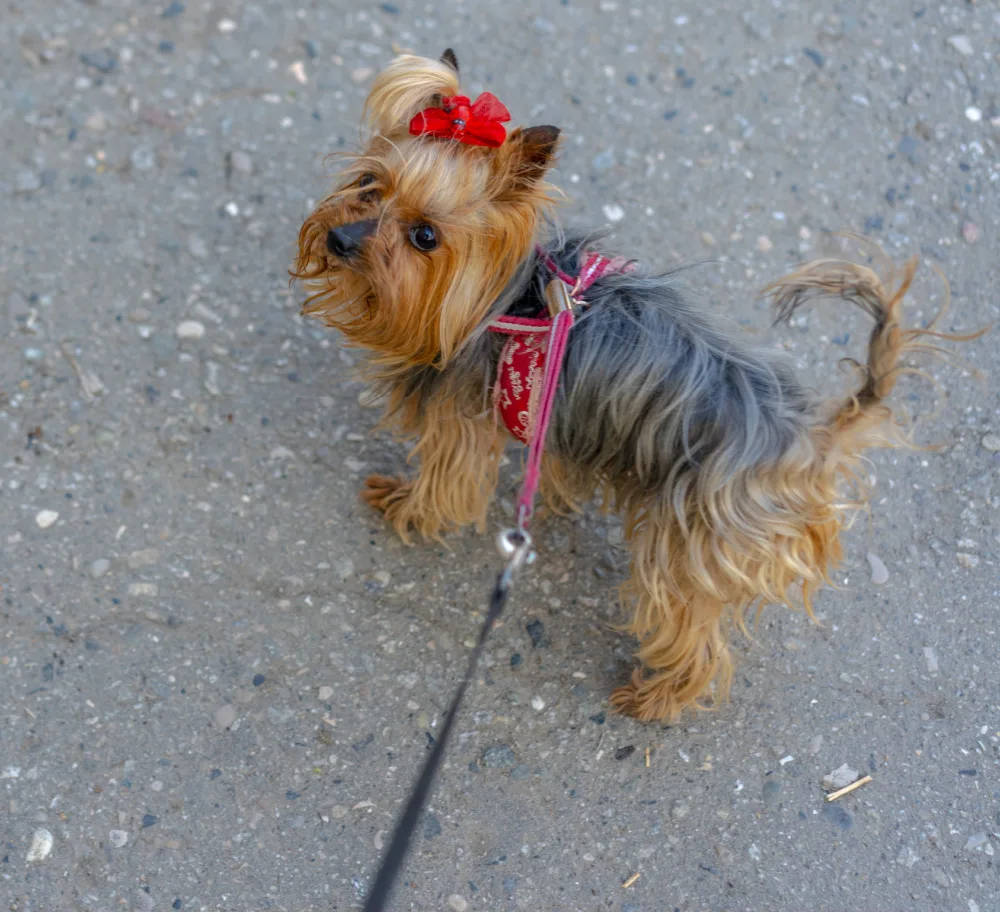
FAQs
Q: How often should I bathe my Yorkie?
A: Every 2-4 weeks, overbathing dries their skin!
Q: Why does my Yorkie follow me everywhere?
A: Congrats, you’re their favorite person! Yorkies are velcro dogs by design.
Q: Are Yorkies good with kids?
A: With gentle, older kids, yes! Always supervise—they’re fragile. This post will help you to learn more about if the Yorkshire terrier breed is right for your family.
Final Thought: Yorkies aren’t just pets—they’re full-blown family members with opinions. With this updated care guide, you’re ready to give your tiny BFF the lavish life they deserve. Now go forth and spoil that pup!
Updated April 2025 – Because your Yorkie deserves the latest and greatest! 🐾
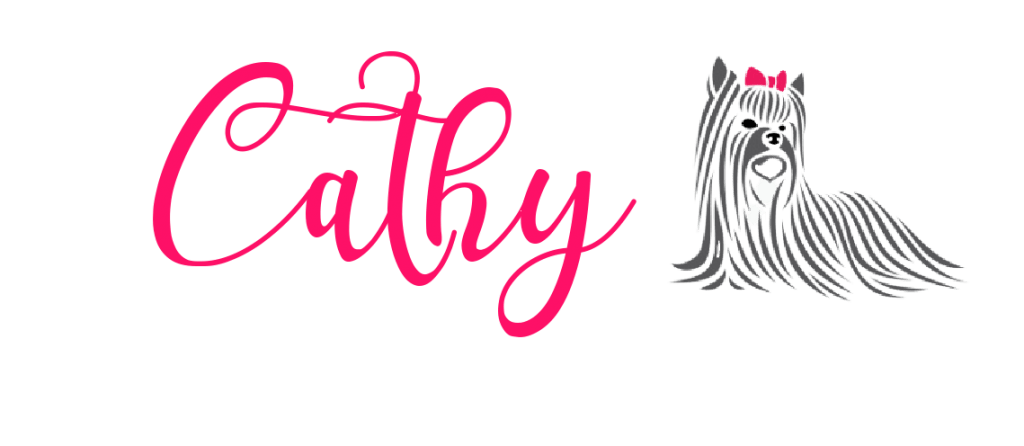

Cathy Bendzunas
Dog Blogger, Former Dog Groomer
I have adored Yorkies for well over 50 years. As a young adult, I began to show and breed them. Now, I just write about them and have several in my little pack of small dogs.
I have had dogs all my life and have trained as a dog groomer. I also have been a kennel worker, worked in a pet hotel through PetSmart, and still am a pet sitter.
Check out my bio for more information about me.
PIN FOR LATER:
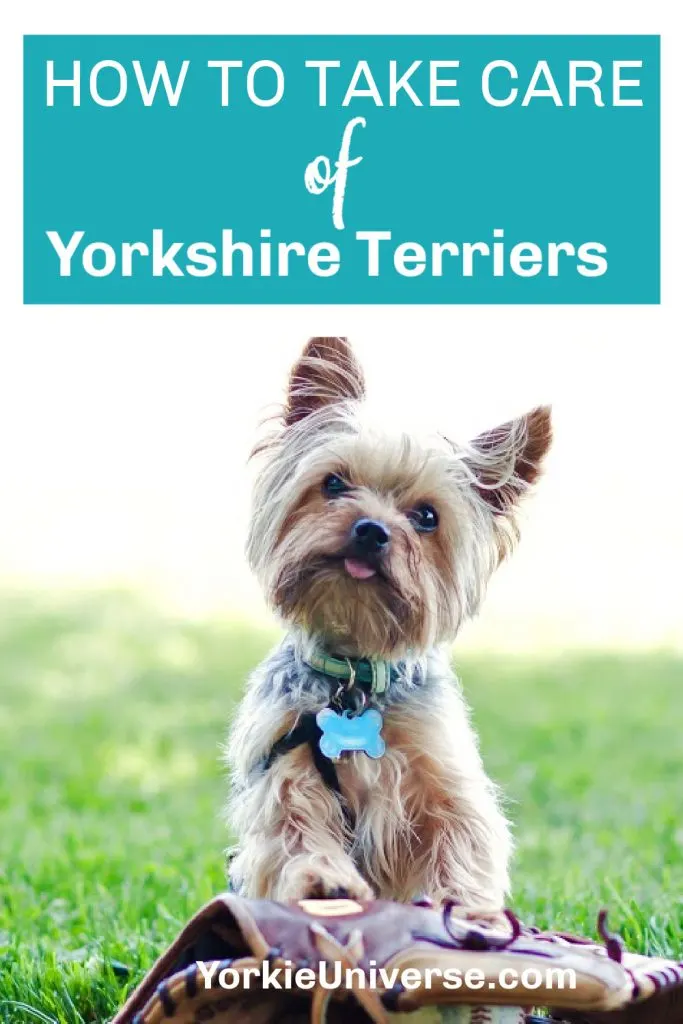

ORSI1
Wednesday 6th of January 2021
Thank you!!1
MomOfZiggy
Thursday 7th of January 2021
You're welcome